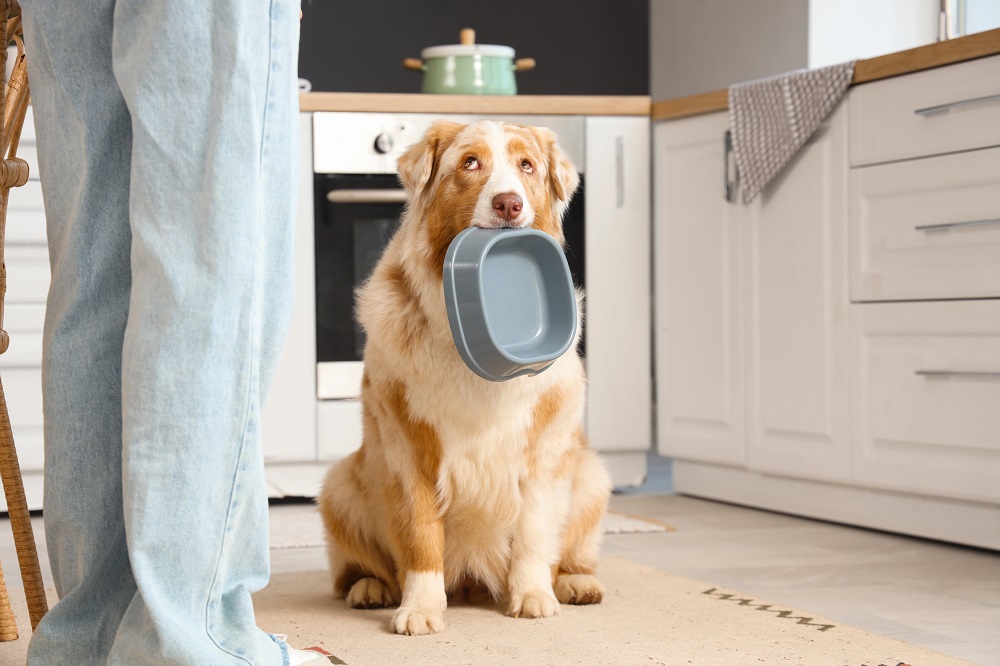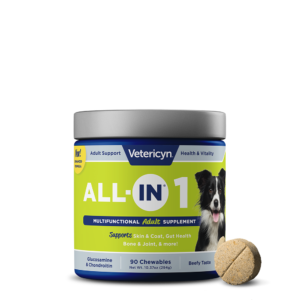Updated Aug 21, 2025
It’s a well-known fact that the key to a dog’s heart is its stomach. Watching how quickly your dog gobbles up a treat is all the scientific evidence needed.
But while kombucha, yogurt, and fiber supplements may be the trendy solution for human gut health, there’s a little more to the story inside your dog’s belly.
There are simple, natural ways to promote your dog’s gut health and long-term benefits, including a probiotic, a supplement, or plain old gut-healthy foods.
Below is a breakdown of your dog’s gut health and how to maintain it so they stay tummy-ache-free (with room to wolf down a treat or two).
Why Gut Health is Important for Dogs
One study showed 61% of the dogs evaluated had health issues, and 57% of those were suffering from a digestive problem in particular.1
You might have heard that the gut is the “second brain.”2 It’s where the phrase “listen to your gut” comes from. Our gastrointestinal tracts hold the largest and most nuanced part of the peripheral nervous system, which is known as the enteric nervous system, which alerts the brain when something’s wrong.3 It’s why we have butterflies in our stomachs, that churning feeling in our tummies, or might occasionally take a trip to the toilet during times of distress.
The same goes for your dog. Your pet’s gut is his second brain, too—and not just because obtaining his next Scooby snack seems to govern his every decision.
Diarrhea, bloating, flatulence, constipation—all can ensue if your pup’s microbiome and digestive health aren’t in optimal working order. Ensuring your pup’s second brain remains sharp might not only keep these tummy woes at bay but may also organically encourage immune health.4
Fortunately, there are a variety of supplements and dietary swaps that may help keep your dog’s digestive tract running at peak function. Read on to learn about the most gut-healthy choices you can make on your pup’s behalf.
Probiotics for Your Pooch
If you’ve heard the phrase “good bacteria,” you already know the basics of probiotics. Probiotics are live bacteria found in foods or supplements that are intended to improve the gut microbiome—a vast, complex colony of microbes that influences everything from demeanor to digestion.5
Including probiotics in your dog’s diet may nourish gut health and correct imbalances among these critical organisms.
Why is this imperative?
More microbes are living in your dog’s gut than there are humans on Earth! Veterinary scientists have found that a balanced gut microbiome boosts your pup’s GI tract function and nurtures immune health, hormonal balance, and nutrient absorption.6
Choosing the Best Probiotic Supplement for Your Dog
A probiotic supplement is an easy, healthy way to ensure your pup is packing those “good” gut bacteria into his or her diet.
Veterinarians recommend unflavored probiotic supplements—one with a diverse array of nutrients and types of gut bacteria included is best.7
Vetericyn’s ALL-IN support for puppies, adult dogs, and senior dogs. It contains probiotics and prebiotics (more on these below), plus other nutrients that may promote bone, joint, muscle, skin, and heart health.
Keep in mind that while probiotic supplements are a healthy choice for nearly all dogs, they’re not a panacea for those with chronic or underlying issues. If your pet’s upset tummy becomes pervasive, consider a trip to the vet in tandem with their supplement routine.
Do Dogs Need Prebiotics, Too?
Prebiotics are dietary fibers that act as food for probiotics in the gut.3
Prebiotics are essential to a thriving microbiome. Prebiotics can help your pet stay “regular” and absorb nutrients. They may fortify intestinal, immune, and bone health.8 They have short and long-term health benefits for healthy adult and senior dogs and are vital for animals suffering from diseases that disrupt gut health, such as pancreatic insufficiency, chronic bowel inflammation, and obesity.8
Natural prebiotic supplements are available for dogs.
Doggy Dietary Choices for Gut Health
Making simple swaps in your pup’s diet and dog food could transform her gut microbiome before her next weekly playgroup session. Studies show that introducing more fiber into your pet’s diet can cause metabolic changes within two days and a full bacterial community transformation by day six.10 However, veterinarians still recommend gradually introducing or changing food to prevent stomach upset.
Below is a list of foods you can include in your dog’s diet (in addition to a probiotic supplement and veterinary-recommended dog food) to nurture a healthy gut. Most should be served only in small amounts, without seasoning or salt, and are not recommended for dogs with illnesses, so be sure to talk to your veterinarian before adding these to your dog’s diet.
- Fresh veggies packed with fiber (i.e. broccoli, leafy greens, carrots)
- Fermented foods (i.e. unsweetened whole milk yogurt or carrots)
- Gentle, plant-based foods rich in probiotics (i.e. small amounts of bananas, sweet potatoes)
- Prebiotic-rich, dog-safe, plant-based foods (i.e. pumpkin, butternut squash)
- Apple cider vinegar (in moderation)
- Lean meats and proteins (i.e. turkey, boneless/skinless chicken, cooked eggs)
- Mushrooms – only store-bought; wild mushrooms may be toxic or deadly
Ask your vet before giving your dog any new foods, especially foods people eat. What’s safe for one dog might not be safe for another, depending on things like age or health. If your dog is on a special vet-prescribed diet, don’t give them any extra food or treats.

Other Gut-Healthy Practices for Your Pup
Beyond the aforementioned dietary switches and add-ons, there’s more you can do to support your pet’s second-brain IQ. Plus, most of these practices have additional benefits for your dog’s health. It’s a win-win.
Hydration
Drinking ample, clean water every day has been proven to encourage a diverse microbiome.11 Dogs should drink about as many fluid ounces of water per day as they weigh in pounds.12
Yet, it’s often hard for your pet to hit that target since they’re lapping up water in such small quantities (and they can’t exactly tote around an emotional-support water bottle).
For this reason, it’s important to keep your pup’s water bowl full, and consider carrying a portable one, especially on hot days and/or long walks.
Reduced Stress
Reducing stress is key to a healthy gut, as stress can contribute to—and exacerbate—symptoms of nearly any physical ailment. Despite their lack of a 9-to-5 workday, dogs may experience stress just as much as humans. If you notice your pet growling, whining, pacing, or shivering, he or she might be experiencing a bout of anxiety.13
If you sense that your pup is a bit on edge, try calming them down with affection and TLC. If that doesn’t seem to help, you can try other methods, like taking them on a walk, diffusing essential oils for aromatherapy, playing classical music, or dressing your dog in a compression shirt. Talk to your veterinarian if your dog’s anxiousness persists.
Checking for Intolerances and Allergies
In some cases, your dog’s gut health may be out of balance due to an undetected food intolerance or allergy.
Just like humans, dogs can be intolerant or allergic to ingredients that might be included in their kibble formula, such as:
- Gluten
- Eggs
- Dairy
Talk to your vet about possible food allergies. They can conduct allergy testing or guide you through a food trial to find out if food allergies are a concern.
Symptoms to Watch Out For
Symptoms of digestive trouble include14:
- Vomiting
- Regurgitation
- Weakness and fatigue
- Changes in appetite
- Frequent flatulence
- Constipation
- Weight loss
- Blood or mucus in the stool
If you notice any of these symptoms, bring your pet to the vet. Whether it’s an easily treatable bacterial imbalance or a more serious disease like pancreatitis, catching digestive issues early is the best way to keep your precious pup flourishing for years to come.

Boost Your Dog’s Overall Health with Vetericyn
Vetericyn is here to make a healthy gut for your dog a reality. Our ALL-IN dog supplement contains a wide array of nutrients and superfoods, including a powerful combo of digestive enzymes. With a one-of-a-kind absorption technology, this safe, natural formula is designed to promote a healthy microbiome. Talk to your veterinarian about All-In and serve it like a daily vitamin to boost your pup’s overall health.
Next time you’re concerned about your pup’s digestive health, trust your own gut and invest in ALL-IN.
 Reviewed by Dr. Kathy Adamson
Reviewed by Dr. Kathy Adamson
Dr. Kathy Adamson earned her bachelor’s degree from the University of Notre Dame and her Doctor of Veterinary Medicine degree from the University of Wisconsin-Madison School of Veterinary Medicine.
She completed a one-year small animal medicine and surgery internship at the North Carolina State College of Veterinary Medicine. Alongside her studies, Kathy worked in a research lab, contributing as an author and co-author to various journal articles.
She has also pursued medical writing and editing certification through the University of Chicago Graham School. Currently, she runs KMA Veterinary & Medical Writing, a freelance medical writing company, serves as the Digital Content Manager for the Greater Chicago Area Chapter of the American Medical Writers Association, is a member of the AMWA Communications Committee, and enjoys writing about healthcare topics for people and their cherished pets.
![]() https://www.linkedin.com/in/kathyadamsondvm/
https://www.linkedin.com/in/kathyadamsondvm/
Sources:
- National Library of Medicine. Prevalence of common canine digestive problems compared with other health problems in teaching veterinary hospital. https://www.ncbi.nlm.nih.gov/pmc/articles/PMC4774851/
- Harvard University. The gut and the brain. https://hms.harvard.edu/news-events/publications-archive/brain/gut-brain
- Gastroenterology Research and Practice. The enteric nervous system and its emerging role as a therapeutic target. https://www.ncbi.nlm.nih.gov/pmc/articles/PMC7495222/
- Frontiers in Veterinary Science. The role of the canine gut microbiome and metabolome in health and gastrointestinal disease. https://www.ncbi.nlm.nih.gov/pmc/articles/PMC6971114/
- Open Veterinary Journal. Role of gut microbiota in dog and cat’s health and diseases. https://www.ncbi.nlm.nih.gov/pmc/articles/PMC6794400/
- Texas A&M University. The benefits of a balanced microbiome. https://vetmed.tamu.edu/news/pet-talk/the-benefits-of-a-balanced-microbiome/
- Texas A&M University. Choosing the best probiotic for upset tummies. https://vetmed.tamu.edu/news/pet-talk/probiotics/
- Fermentation. Potential effects of prebiotics on gastrointestinal and immunological modulation in the feeding of healthy dogs: a review. https://www.mdpi.com/2311-5637/9/7/693
- VCA Animal Hospitals. Leaky gut syndrome in dogs. https://vcahospitals.com/know-your-pet/leaky-gut-syndrome-in-dogs
- University of Illinois. New dog food? Study shows Fido’s gut bacteria could turn over within a week. https://aces.illinois.edu/news/new-dog-food-study-shows-fidos-gut-bacteria-could-turn-over-within-week
- National Library of Medicine. Drinking water source and intake are associated with distinct gut microbiota signatures in US and UK populations. https://pubmed.ncbi.nlm.nih.gov/34642755/
- PetMD. How much water should a dog drink? https://www.petmd.com/dog/nutrition/evr_dg_the_importance_of_water
- AKC. How to tell if your dog is stressed. https://www.akc.org/expert-advice/advice/how-to-tell-if-your-dog-is-stressed/
- All Aboard Animal Hospital. Gastro problems in dogs: signs you need to look for. https://www.allaboardanimal.com/common-gastro-problems-in-dogs/#signs-your-dog-has-a-gastro-problem
- Cleveland Clinic. Probiotics. https://my.clevelandclinic.org/health/articles/14598-probiotics

